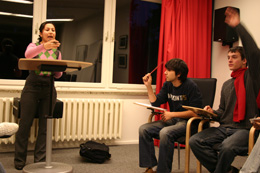
For the last three weeks the Debate Club has been meeting every Wednesday at 4pm in the Lecture Hall. Developing rhetoric skills in students is a good reason for introducing such an activity here at ECLA. However, this is not why Martin decided to be ECLA’s debate trainer: ‘What determined you to set up the Debate Club? Addiction.’ Yes, that’s right – addiction, contagious addiction.
Martin has been a debater since 2001 and became international at it in 2004. He gained most of his experience in the UK, which is why he feels so strongly about using the British Parliamentary Debate Format at ECLA, instead of the American one. As he explains, the British model is used throughout Europe, having two teams for and two against – which allows team members to be assigned different roles. In addition, it puts more emphasis on the quality of the speech, rather then on the points made, while team work is also an advantage. This makes it ideal for ECLA’s non-native English speakers, because it involves ‘a thousand times more rhetoric’.
What debating comes down to is fluency. A debater does not choose certain topics that are easier to approach, but uses the debate in learning how to speak better. Thus, the topic is of lesser importance ‘I’ve heard brilliant speeches on terrible topics and the other way around.’
Martin also let us in on an unofficial rule of the game – that debaters always return the favour of learning new skills by training others. This is probably what Martin is doing now, seeing that he is planning to take our team to international competitions. With this aim in mind, having a permanent team is bad practice, since all teams should be prepared well enough to represent ECLA. Therefore, part of the preparation will be to always switch opponents and rhetoric styles.
As far as the future of the Debate Club is concerned, by the end of the year, Martin expects ‘people will be able to speak less and say more’. Debating is certainly addictive and contagious at ECLA – members of the Club have just decided to also meet on weekends, whenever possible. Some topics will be announced beforehand, so as to come prepared with information. On other occasions, ‘most sessions will be up for grabs’ and more popular topics will prevail by democratic voting system. Martin calls out to students and faculty alike to join in.
By Clara Sigheti (AY 2007, Romania)
